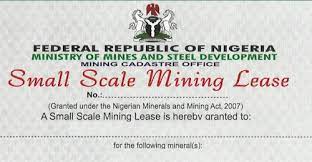Nigeria’s mining industry is a key contributor to the economy, offering lucrative opportunities for businesses and individuals.
However, engaging in mining activities requires obtaining the necessary licenses and permits from the government.
This guide provides a simplified and easy-to-understand breakdown of how to acquire a mining license in Nigeria, including the types of licenses available and the necessary steps to follow.
What is a Mining License?
A mining license is an official authorisation from the Nigerian government that allows you to conduct mining operations such as exploration, extraction, processing, and trading of minerals.
The license defines the type of minerals, the area you can mine, and the duration you are allowed to carry out these activities.
Legal and Regulatory Framework for Mining in Nigeria
Mining operations in Nigeria are governed by several laws, with the primary ones being:
- Nigerian Minerals and Mining Act (2007)
- National Minerals and Metals Policy (2008)
- Nigerian Minerals and Mining Regulations (2011)
Other applicable laws include the Companies and Allied Matters Act (2020) and the Nigerian Investment Promotion Commission (NIPC) Act.
The Ministry of Mines and Steel Development (MMSD) and the Mining Cadastre Office (MCO) are the key regulatory bodies responsible for issuing mining licenses.
Types of Mining Licenses
There are different types of licenses based on the specific mining activity you want to engage in.
Each has its own requirements and conditions:
1. Exploration License
This is the first step for companies or individuals seeking to explore mineral deposits. The license allows you to assess the potential of mineral resources within a specified area. Once exploration proves successful, you may apply for a Mining Lease.
Requirements for an Exploration License:
- Certificate of incorporation and company documents
- Completed application forms
- Pre-feasibility report and prospecting plan
- Evidence of financial capability
- Evidence of technical competence (e.g., COMEG-accredited geologist)
- Irrevocable consent from landowners/occupiers
- Payment of applicable fees
2. Mining Lease
A Mining Lease grants the holder the exclusive right to extract and market minerals from a defined area. It covers an area up to 50 km² and is valid for 25 years, with the option to renew for another 24 years.
Requirements for a Mining Lease:
- Holder of a valid Exploration License
- Proof of commercial viability of the mineral resources
- Financial and technical capability to carry out mining activities
- Irrevocable consent from landowners
- Completed application forms and company incorporation documents
3. Small Scale Mining Lease
This license is meant for smaller, low-tech mining operations, such as artisanal mining. It covers an area of up to 3 km² and is valid for 5 years, with the possibility of renewal.
Requirements for a Small-Scale Mining Lease:
- Applicant must be a Nigerian citizen or Nigerian-incorporated company
- Certificate of incorporation and technical competence
- Evidence of financial capacity
- Irrevocable consent from landowners
- Payment of required fees
4. Possess or Purchase License
This license allows companies to deal in mineral resources, including the trading and exporting of minerals, without owning a mining lease. It is valid for one year and can be renewed.
Requirements for a Possess or Purchase License:
- Certificate of incorporation and company documents
- Application letter detailing the minerals to be possessed or purchased
- Evidence of technical competence and financial capability
- Letter of consent from the title holder (if needed)
- Payment of fees
5. Mineral Buying Centre License
This license allows companies to set up a facility where mineral resources can be processed, stored, or traded. It is ideal for companies looking to operate mineral trading centres.
Requirements for a Mineral Buying Centre License:
- Certificate of incorporation and company documents
- Application letter stating the minerals to be traded
- Established warehouse facility for processing or trading minerals
- Evidence of technical competence
- Payment of applicable fees
6. Mineral Export Permit
This permit is required each time you want to export mineral resources from Nigeria. It ensures compliance with export regulations and allows for the legal export of minerals.
Requirements for a Mineral Export Permit:
- A valid Possess or Purchase License
- Export Certificate from the Ministry of Mines and Steel Development
- Evidence of royalty payments
- Payment of prescribed fees
Government Incentives for Mining Operators
The Nigerian government provides several incentives to promote investment in the mining sector. These include:
- 75% capital allowance on capital expenditure in the first year, and 50% in subsequent years
- 5% investment allowance
- Exemption from customs and import duties on approved machinery and equipment
- Exemption from expatriate quotas for approved expatriate personnel
- Tax exemptions for the first three years of operation
- Protection against nationalisation and expropriation of mining titles
Conclusion
In Nigeria, mining without the proper licenses is illegal, and acquiring the appropriate permits is crucial for anyone interested in mining activities.
Consulting with legal professionals during the application process is highly recommended to ensure compliance with all regulations and avoid penalties.


